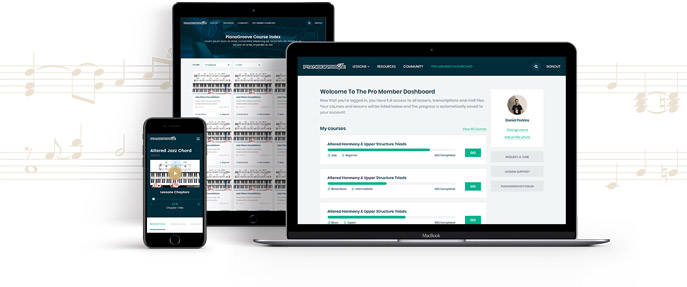Syllabus Overview
Our 251 Progression Syllabus explores the most important progressions in jazz music; the major, minor, and rootless 251 progressions.
Who Is This Syllabus For?
- Students who want to understand how chords fit together
- Students who want to expand their harmonic vocabulary
- Students who want to create rich and lush 251 progressions
Most jazz standards contain a 251 in some form and so learning these progressions is a key step in mastering the jazz language.
Learning Path
Our 251 Progression Syllabus covers the most important variations of the 251 progression so that we can read and interpret lead sheets quickly and effectively.
Chord Extensions: 9ths, 11ths, & 13ths
If we extend our chords past the 7th degree of the scale, we access 9ths, 11ths, and 13ths. Extended chords create a richer sound than triads and 7th chords and they are used in jazz music to create more interesting harmonic progressions.
Useful Extended Voicings
We introduce 3 useful extended voicings; the "So What Voicing", the "Herbie Hancock Voicing", and the "Kenny Barron Voicing". We cover exercises to memorise these voicings in all 12 keys and how to apply to the 251 progression.
Extended 251 Progressions
Now that we understand the concept of chord extensions, we can add these tones to our 251 progressions to create more sophisticated sounds. We explore 251 drills to help us visualise the 9th and 13th extensions in major 251s.
Rootless 251 Progressions
We then explore rootless harmony which sets the foundation to study more advanced voicing techniques. When playing chords in jazz, we can omit the root and also rearrange the notes to achieve different sounds and textures.
Minor 251 Progressions
After studying the major 251 we can then move onto the minor 251 progression. Minor harmony is more complex than major harmony and sets the foundation for our upcoming study of chord alterations and altered harmony.
251 Drills & Exercises
We conclude this syllabus with a selection of 251 drills and exercises incorporating both major and minor keys. We use the circle of fifths to ensure we are hitting all 12 keys and demonstrate practical application to jazz standards.
Courses
The 251 Progression Syllabus contains 2 courses which should be studied in the following order:
1. Extended Chords & Voicings
2. Rootless Voicings & Stride Piano
Your Teachers

Hayden Hill
Hayden founded PianoGroove in 2015 with the goal of making the world a more musical place. He shares his love for jazz piano through his online courses and manages the community area of PianoGroove.
View Full BioDownloads
-
Chord Extensions Supplement File Type: pdf
-
Jazz Voicings Cheat Sheet File Type: pdf
-
So What Chords Transcript & Notes File Type: pdf
-
So What Voicing 12 Keys File Type: pdf
-
Herbie Hancock Voicing – 12 Keys File Type: pdf
-
Herbie Hancock Voicing Worksheet File Type: pdf
-
Kenny Barron Voicings File Type: pdf
-
Chord Extensions Practice Plan File Type: pdf
-
Whole Step Extended 251s Type A File Type: pdf
-
Whole Step Extended 251s Type B File Type: pdf
-
Rootless Major 251 Progressions – 12 Keys File Type: pdf
-
Minor 251 Notation – All 12 Keys File Type: pdf
-
Minor Chord Progressions Notation File Type: pdf
-
Rootless Voicings Practice Planner File Type: pdf
Forum Threads
Ask questions to get prompt replies from our team of teachers, participate in improvisation exercises and studies, and join in the discussion with students and teachers from around the globe:
Chord Extensions Practice Planner
Rootless Voicings Practice Planner
Beginner Question For 251 Progression - Major & Minor II V I
Weekly Transcription / Improvisation Exercises - Beginner
Question About 9th Chords
Kenny Barron Minor 11th Voicings
Understanding Rootless Voicings
How To Practice Major 251s
How To Practice Minor 251s
Tunes For Practicing Minor 251s
Naming Chord Extensions In Jazz
The -11b5 Voicing in Minor 251s
Student Reviews
It’s what our students say that really means something. We use Trustpilot because it tells us – and everyone else – exactly what real students think of our online school and community. These reviews tell us what our students love. What they love a little less. And where there’s room for us to improve. Read on to find out what PianoGroove’s students think of our service:



